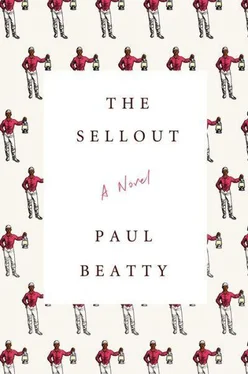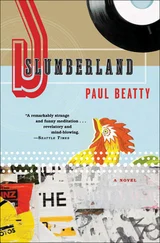“Partial credit. Stalin had every Russian soldier in this photograph shot for fraternizing with the enemy.”
Depending upon how much of a science-fiction geek you are, it’s either Star Wars II or V . But whichever one it is, in the middle of the climactic light-saber duel between Darth Vader and Luke Skywalker, right after the Dark Lord cuts off Luke’s arm, my dad snatched the flashlight from an usher’s hand, then slammed a black-and-white photo into my chest. So what happened next? In the fuzzy circle of light, a young black woman in an exquisitely ironed white blouse and tablecloth-patterned skirt protectively clutched a three-ring binder to her still-developing chest and psyche. She wore thick dark black shades, but stared past both me and the screaming white women tormenting her from behind.
“She’s one of the Little Rock Nine. They sent in federal troops. She went to school. And things ended happily ever after.”
“What happened next was that the following year the governor, rather than continuing to integrate the school system as required by law, shut down every high school in the city. If niggers wanted to learn, then no one was going to learn. And speaking of learning, notice they don’t teach you that part in school.” I never said anything about “they” being teachers like my father. I just remember wondering why Luke Skywalker was tumbling headlong into the starlit abyss for no apparent reason.
Sometimes I wish Darth Vader had been my father. I’d have been better off. I wouldn’t have a right hand, but I definitely wouldn’t have the burden of being black and constantly having to decide when and if I gave a shit about it. Plus, I’m left-handed.
So there everybody was, stubborn as grass stains, waiting for someone to intervene. The government. God. Color-safe bleach. The Force. Whoever.
Exasperated, Charisma looked over at me. “When does shit ever end?”
“It doesn’t,” I muttered, and stepped into the breezy perfection that is the springtime California morning. Foy had prepped his troops for a boisterous chorus of “We Shall Overcome.” They were joined together arm-in-arm, swaying and humming slowly to the beat. Most folks think “We Shall Overcome” is still in the public domain. That through the generosity of the black struggle, its empowering refrains are free to be sung by anyone anytime one feels the stings of injustice and betrayal, which is how it should be. But if you stood outside the U.S. Copyright Office and protested people profiting from a stolen song by singing “We Shall Overcome,” you’d owe the estate of Pete Seeger a nickel for every rendition. And even though Foy, singing for all he was worth, had seen fit to change the poignant “someday” lyric to a screaming “Right Now!” I dropped ten cents on the pavement as a precaution.
Foy lifted his hands high overhead, his sweater popping over his potbelly and exposing a gun handle sticking out of his Italian-leather beltline. That explained the lyric change, his impatience, the letter, and the desperate look in his eyes. And why didn’t I recognize it sooner, the absence of angularity in his normally pristine box-cut toupee.
“Charisma, call the police.”
No one other than college hippies, Negro jubilee singers, Cubs fans, and other assorted idealists knows verses two through six of “We Shall Overcome,” and when his flock started stumbling over the next verse, Foy pulled his weapon and waved it like a.45 caliber cue card. Exhorting his choir through the rough patches, even though their backs were turned to him, and flying past me and Hominy toward the school’s entrance, which remained closed to them because Charisma had shut the doors behind her.
Dickens doesn’t scatter very easily. Neither does a local media used to gangland slayings and a seemingly endless supply of psycho killers. So when Foy clacked two shots at the back end of his Mercedes crookedly parked on Rosecrans, the crowd only parted wide enough to create a fire lane through which the white kids could reach the relative safety of their school bus, where they lowered themselves into their seats. Desegregation is never easy in any direction, and after Foy fired two more rounds into their civil rights movement, progress would be even slower, because the Freedom Bus had a couple of flat tires.
Foy pumped another shot into the Mercedes-Benz logo. This time the trunk popped open in that slow, majestic way that only Mercedes trunks do, and he grabbed an old bucket of whitewash out of the back. But before I, or anyone else, could reach him, he spun around, warding us off with his strap and his off-key singing. He’d made another lyric change. This time personalizing the tune by changing the refrain to “I shall overcome.” What’s that the judges always say on those televised singing competitions? You really made the song your own.
The pop of a can of paint opening is always a most satisfying sound. And justifiably pleased with himself and his car keys, Foy, still singing at the top of his lungs, rose to his feet and, with his back to the street, aimed his pistol directly at my chest. “I seen it a million times,” my father used to say. “Professional niggers that just snap because the charade is over.” The blackness that had consumed them suddenly evaporates like window grit washed away in the rain. All that’s left is the transparency of the human condition, and everybody sees right through you. The lie on the résumé has finally been discovered. The reason it takes them so long to write their reports has been unearthed, and the tardiness isn’t due to a painstaking attention to detail, but to dyslexia. The suspicions confirmed that the ever-present bottle of mouthwash on the colored man’s desk in the corner, near the restroom, isn’t filled with “a liquid designed to kill bad breath and provide twenty-four-hour protection against germs that cause gum disease and gingivitis,” but peppermint schnapps. A liquid designed to kill bad dreams and provide a false sense of security that your Listerine smile is killing them softly. “Seen it a million times,” he’d say. “At least niggers on the East Coast have the Vineyard and Sag Harbor. What we got? Las Vegas and fucking El Pollo Loco.” Personally, I love El Pollo, and not that I was totally convinced that Foy was a danger to me or anyone else, but if I got out of this alive, the first thing I’d do was visit the one over on Vermont and 58th Street. Order me a three-piece combo — dark, with flame-grilled corn and mashed potatoes, and one of those delicious red fruit punches that taste like my eight-year-old birthday party.
The sirens were half a town away. Even when the county was flush with property tax revenue on overvalued homes, Dickens never received its fair share of civil services. And now, with the cutbacks and graft, the response time is measured in eons, the same switchboard operators who took the calls from the Holocaust, Rwanda, Wounded Knee, and Pompeii still at their posts. Foy turned the gun away from me and raised it to his ear, then with his free hand dumped the pail of unstirred and semi-hardened stain over his head. In clumpy folds, the paint oozed over the left half of his face and down the length of that side of his body, until one eye, one nostril, one shirtsleeve, one pant leg, and one Patek Philippe watch were washed completely white. Foy was no Tree of Knowledge, at most he was a Bush of Opinion, but in any case, it was obvious that, publicity stunt or not, he was dying on the inside. I looked down at his roots. One brown shoe splattered with paint from the milky waterfall that sluiced through his goatee and fell from his chin. This time there was no doubt that he’d lost it, because if there’s one thing a successful black man like Foy loves more than God, country, and his ham-hock-limbed mama, it’s his shoes.
Читать дальше












